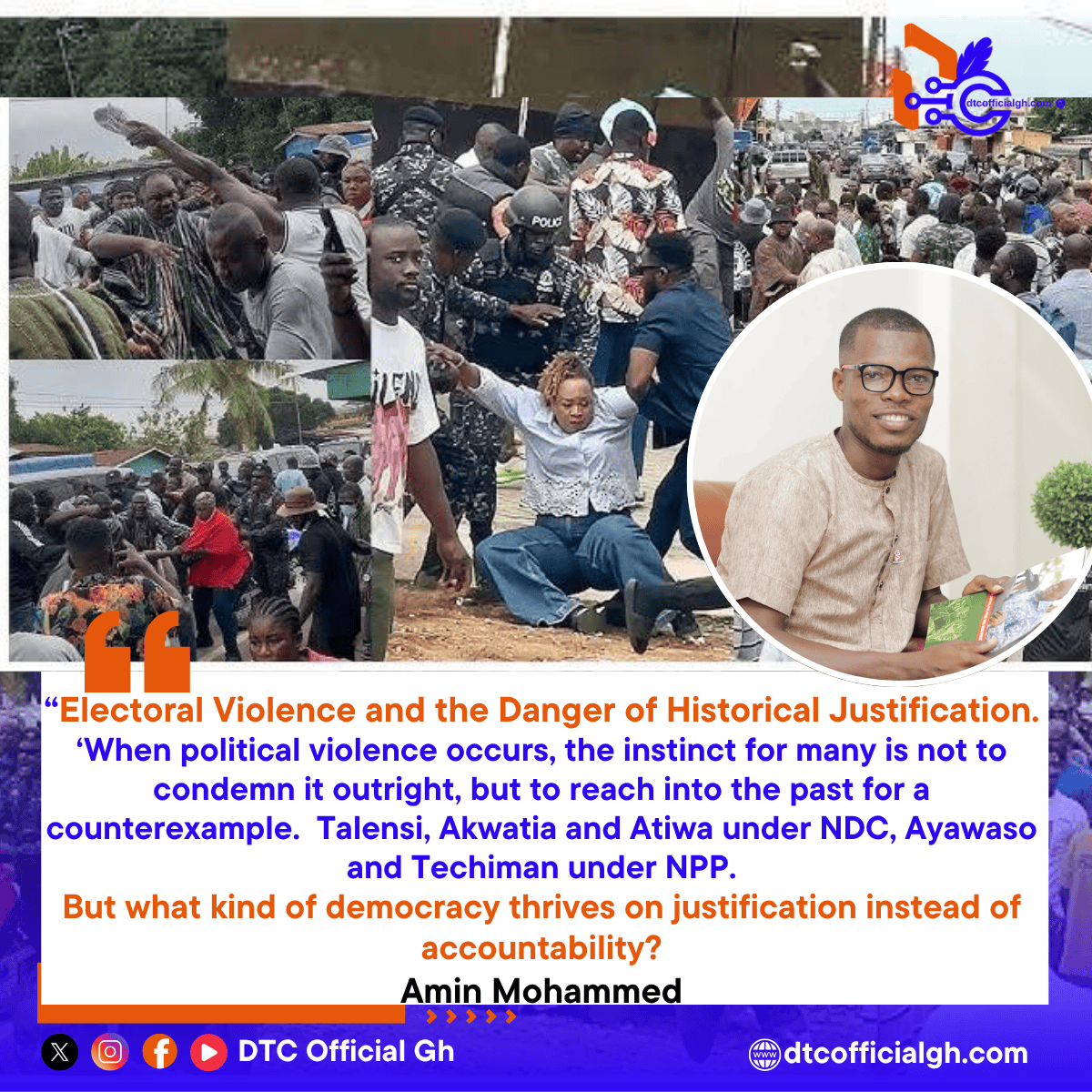Electoral Violence and the Danger of Historical Justification.

The recent violence that erupted during the Ablekuma by-election is yet another painful reminder of a dangerous trend in Ghanaian politics, one where elections are no longer defined by the will of the people but by intimidation, aggression, and silence from those who should know better.
The attack on Hon. Mavis Hawa Koomson, a sitting Member of Parliament and Deputy National Organizer of the New Patriotic Party (NPP), reportedly by vigilantes aligned with the National Democratic Congress (NDC), has sparked outrage and revived a debate that Ghana never seems to resolve: the normalization and justification of electoral violence through historical comparison.

In conversations with members of opposing parties, I’ve heard the same refrain: “Where was your voice during Techiman? What about Ayawaso? The NPP did worse.”
This argument, though common, is deeply flawed, and profoundly dangerous.
History Should Inform Us, Not Excuse Us
When political violence occurs, the instinct for many is not to condemn it outright, but to reach into the past for a counterexample. Talensi in 2015, Akwatia and Atiwa under NDC, Ayawaso and Techiman under NPP, each party has its own list of scars, and each side uses them as shields whenever they’re called out.
But what kind of democracy thrives on justification instead of accountability?
The cycle goes like this: One party engages in violence, the other responds by forming “protective” groups, which then become perpetrators themselves. And when power changes hands, the excuses simply change uniforms. It becomes a dangerous loop where history is weaponized instead of learned from.
READ ALSO: Building Cape Coast as a Business City Starts on the Ground, Not in the Air
Let’s be clear:
retaliation is not justice, and silence in the face of wrongdoing, regardless of who is in power, is complicity.
For more insights and inspiring stories , kindly follow us on Twitter and WhatsApp for more.
True Political Maturity Is Measured in Restraint and Responsibility
After the Ayawaso incident, the Akufo-Addo administration passed laws through Parliament to ban political vigilantism. Groups like Delta Force and the Invincible Forces were officially disbanded. It was a step forward, however imperfect.
What the violence at Ablekuma has exposed, however, is that the machinery of violence within our political space hasn’t truly been dismantled. It has merely gone underground, ready to be reactivated during heated contests. What makes this more alarming is that, this time, it is happening under a new administration, one that promised civility, transformation, and a higher moral code.
Unfortunately, political maturity in Ghana often ends with the campaign trail. Once in power, leaders forget the very standards they demanded of others. The youth, who should be looking to leaders as examples, are left disillusioned. And if this disillusionment continues, we may not only lose voter confidence, we may lose the very foundation of our democracy.
A Simple Truth: Violence Is Violence, No Matter the Color
It is time we stop equalizing wrongs. Whether it is Ayawaso or Ablekuma, Techiman or Talensi, violence must be condemned regardless of who commits it. This is not about defending a party, it’s about defending the nation.
Our democracy can no longer afford the luxury of selective outrage.
We need bold leadership from both sides. Leadership that says: “Enough is enough.” Leadership that acts swiftly to punish perpetrators, not protect them. Leadership that doesn’t wait for a political opponent to err before finding its voice.
For more insights and inspiring stories , kindly follow us on Twitter and WhatsApp for more.
A Final Word to the Youth and Future Leaders
To the young politicians, activists, and voters of Ghana: the future of this country is in your hands. If you blindly inherit this cycle of justification and silence, you will become part of the problem. But if you break the cycle, if you call out wrong when it happens, and insist on peace, accountability, and fairness, then you become the foundation of a better Ghana.
This is a call, not just for condemnation of violence, but for a complete shift in our political consciousness.
Let history be our guide, not our excuse.
READ ALSO: Free Trade, But Where’s the Free Movement?




